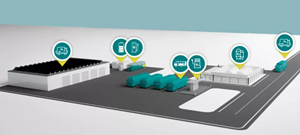News
Energiequelle launches its first H2 project in Finland
Energiequelle has received planning consent for its Oulu Green H2 Park project. It is the company's first public H2 project in Finland and is to be developed in the city of Oulu, 600 kilometers north of Helsinki. The first phase of the project includes the construction of a H2 production plant with a maximum capacity of 5 MW and a H2 refueling station for buses and heavy commercial vehicles.
"If the right market conditions are met, we expect the first phase to be ready by 2028. However, this is a major industrial project and investment, so the planning reservation we have now received is only one of the first steps towards making concrete investment decisions. In projects of this size, planning and studies are always carried out carefully," commented Karl Schultheis, Head of New Business Development at Energiequelle Finland.
In the next phase, the capacity of the H2 production plant would be increased by to 10 MW-50 MW and H2 exports via the planned H2 pipeline and the port of Oulu could be an option, if the needed infrastructure is available. In the third phase, production would be further increased to an additional capacity of 100 MW-500 MW. The schedule and full size of the project is highly, depending on the market situation and the infrastructure available in the selected new greenfield site.
The City of Oulu has reserved a total of three new H2 production and processing plants (including the Energiequelle project) on the same industrial site, with a combined potential capacity of maximum 1,500 MW.
"We believe that Oulu's strategy of bundling several H2 production operators in the same area is the right one, as it supports the development of H2 transmission infrastructure in the region and sends a clear message to the energy-intensive industry that they can count on H2 production in the region in the future. This is exactly the kind of predictable investment environment and confidence-building policies we hope to see from local, national and European decision-makers," commented Nils Borstelmann, Managing Director of Energiequelle Finland.
The Oulu Green H2 Park project is Energiequelle's first public H2 project in Finland, but the company has already gained experience in the European H2 market. In February, the group unveiled and opened the HY.City.Bremerhaven project in Germany, which was inaugurated by German Chancellor Olaf Scholz.
"In cooperation with other H2 players, Energiequelle is part of a H2 production facility and refueling station for heavy vehicles in the German city of Bremerhaven, which is very similar to the first phase of the project now planned for Oulu. We therefore have strong belief, that the project will proceed successfully," said Michael Raschemann, the owner of the Energiequelle Group. He adds that of course the realization of the project will also depend on the investment environment and the market situation.
Finland would offer Germany a genuine market-based and clean alternative to natural gas
“From an international and European perspective, Finland has very good conditions and potential for the production of renewable energy and green H2,” said Nils Borstelmann, and points that Finland has a potential to be a major actor in Europe’s energy production – and for Germany. “For several years now, energy in Finland has been one of the cheapest in Europe and already today 95% of Finland's electricity production is already emission-free and all new wind farms are also market-based, without any government subsidies”, Borstelmann continues. “Affordable and clean energy are prerequisites for market-based H2 production, as H2 and its derivatives require a lot of energy. With its extensive land area, Finland also has great potential to significantly increase quickly the production of renewable energy, such as wind and solar power, as the electrification of Europe progresses.”
Karl Schultheis commented, “Finland's national H2 strategy has set a target of producing 10% of all green H2 in the whole European Union, and Germany's national H2 strategy has outlined a national demand for H2 and H2 derivatives of 95 TWh-130 TWh by 2030, of which around 50%-70% (45 TWh-90 TWh) will have to be imported. Finland and Germany are perfect energy partners”.
The Finnish state-owned gas transmission system operator Gasgrid Finland is planning to establish a H2 transport infrastructure to connect Finland and Europe. In January 2025, all Gasgrid’s three H2 transport infrastructure projects in Baltic Sea area were awarded financial support from the European Union.
The Nordic-Baltic H2 Corridor project is developing H2 infrastructure connecting Finnish, Estonian, Latvian, Lithuanian, Polish and German markets. The Nordic H2 Route project is developing a H2 infrastructure between Finland and Sweden along the coastline of the Bothnian Bay. The Baltic Sea H2 Collector project is developing an offshore H2 infrastructure to connect the Finnish, Swedish and Central European markets. These three projects aim to create excellent investment conditions for clean electricity, H2 and H2 processing plants nationally and in the wider Baltic Sea Region.


